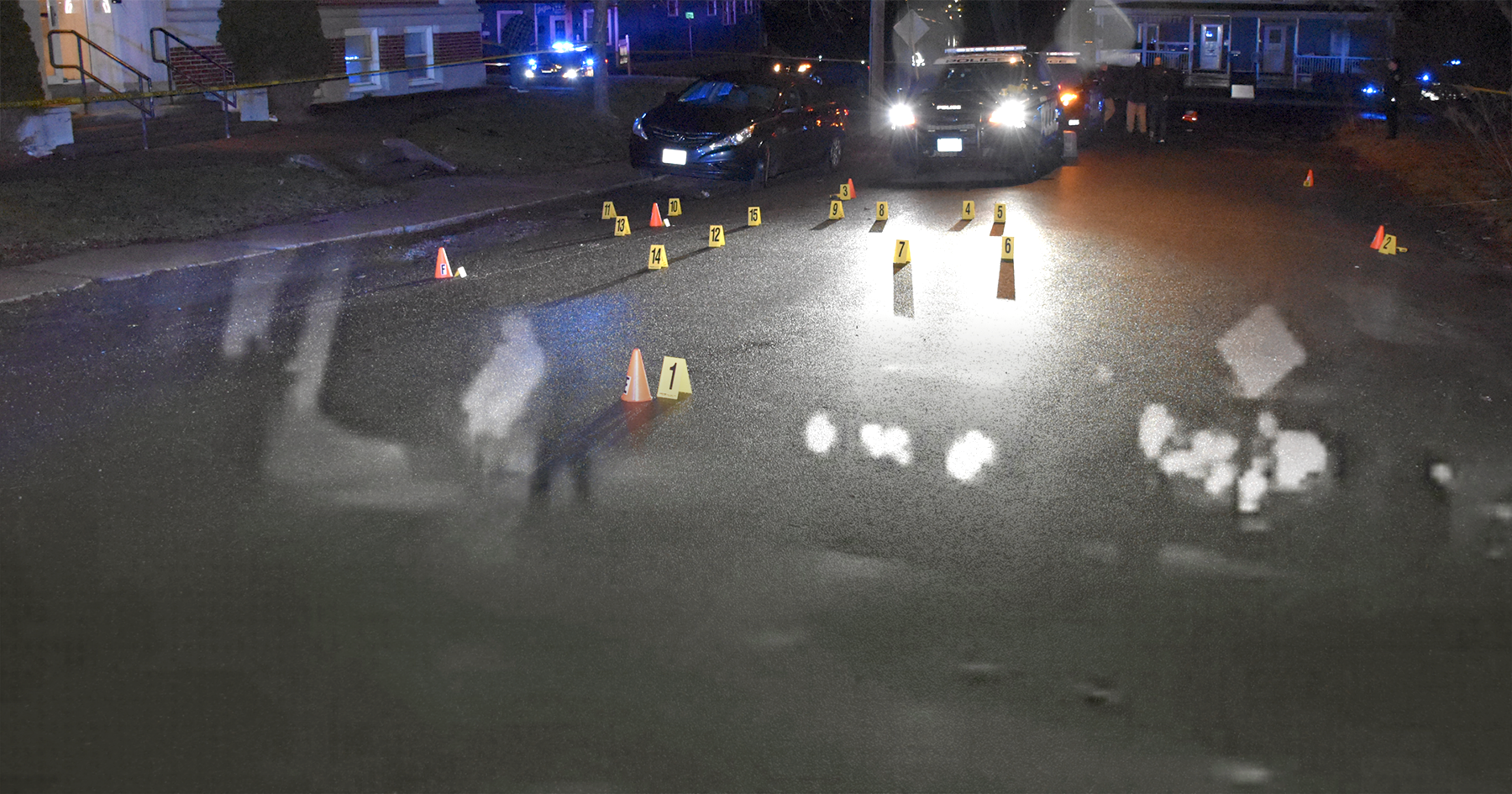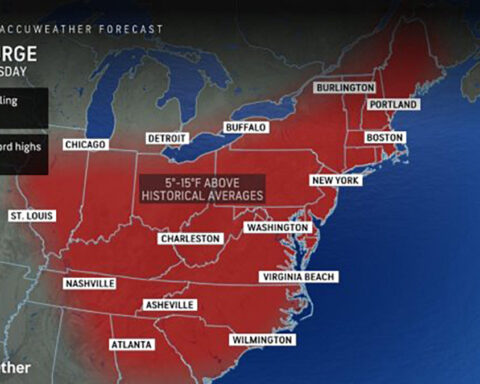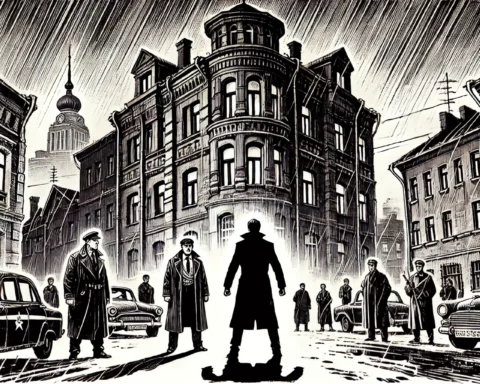Podcast (top-left-corner): Play in new window | Download
Above: The Pittsfield Police Department’s explanation of their actions that led tot he death of Miguel Estrella portrays the facts as crisp as a high-def photo, while the community still finds that explanation as less than clear. Overlay of March 25 crime scene photos from the site of the police killing of Miguel Estrella in Pittsfield onto a still from grainy surveillance footage of the incident; video and photo submitted by Berkshire County District Attorney’s office, graphics by Jason Velázquez.
Jay Velázquez: And this is Episode 169 of the Top Left Corner right here on The Greylock Glass — GreylockGlass.com, the Berkshires mightiest independent alternative newsthing. I’m your host, Jay Velázquez, and I do thank you for tuning in today. At least the day that this was published is Friday, September 2nd. 2022 and looks like it’s going to be a gorgeous day. So if you are occupying the same place in the time-space continuum as I am, enjoyed that. This show is, it’s well, it was it was a show that was never meant to be. I have an interview with Ellen Maxon, who is the chair of the Pittsfield Police Advisory and Review Board, which just saw some real shakeup just yesterday. And I’m going to link to an article by Josh Landes of WAMC in the show notes. He’s done an excellent job covering that breaking news.
What I have is not breaking news. It was actually an interview that I did with Ellen Maxon just a couple of weeks ago that was meant to be part of a larger piece. But due to the fast moving nature of events, I’m going to release this interview in its entirety. Now. Because it makes sense to do that now. So I’ll keep working on the other pieces and present them in some other format, I guess. But this is this is something that you’re going to want to know right now, because it’s it’s critical in what’s going on in Pittsfield regarding the Miguel Estrella shooting by the police officer says about the murder but the district attorney’s Investigation found no criminal liability on the part of the officers. So that would not be accurate, at least as far as any legal observer today observes.
Berkshires Climate Resiliency Report – 2022 Local News Fund
First, though, I wanted to just mention that the GreylockGlass.com just found out yesterday that the local media association just gave us the green light to be part of the 2022 Local Media Fund, which means that the Local Media Association is our fiscal sponsor for the next well, until at the end of the year, until December 31. They are going to accept non tax deductible donations on our behalf. We are unable to do that directly because we’re not a nonprofit organization. They are and as our fiscal sponsor, they are creating an opportunity for you and for businesses or other organizations to support our work.
In this case, specifically about climate, the climate change impacts on the Berkshires over the next however many years that we can predict the different systems, the different sectors of the economy, sectors of the community that are going to be impacted. It’s really it’s really going to be a dense, deep dive into this subject because no one locally is doing that sort of analysis. The number of interlocking pieces is is kind of mind blowing and won’t be able to do it in one published work. It’s going to have to be sort of a series. It’s going to be a lot of a lot of eye opening material, though, I promise you that. And it’s going to give businesses and community leaders real pause and a chance to think about where they’re going to be going in terms of planning. Because, you know, we’re talking about population changes, changes, impacts on the health care system, educational system, transportation system, you name it. There’s almost no part of society that’s not going to be touched.
So what I’d like you to do is I’d like you to help support this make a tax deductible donation to support this work by going to the show notes here and looking for the link to our Give Butter donation page. To Give Butter is a basically a processor that allows all this. That’s the it’s the go between that makes it all happen between us and the local media association. So you can go to the link in the show notes of this episode or go to go directly to give butter slash Berkshires dash climate. So that’s give butterscotch slash Berkshires hyphen climate and that will get you and give, you know, give till it hurts. Because I promise you, this information that I’m going to be digging up is going to be helpful to you, your families, your business, your community.
Jay Velázquez: It’s it’s going to be very impactful. So please do visit the show notes, visit give boston.com slash Berkshires dash climate. And I thank you. Now onto our interview with Ellen Maxon, the chair of the Pittsfield Police Advisory and Review Board right here on the Top Left Corner.
The 2022 Local News Fund is a program administered by Local Media Foundation, a 501(c)(3) organization affiliated with Local Media Association. The purpose of the program is to allow independent and family-owned news organizations to solicit tax-deductible donations from their communities for journalism projects that focus on critical local issues. Contributions to this program are tax-deductible to the full extent of U.S. law; please consult a tax advisor for details.
NTRVW: Ellen Maxon, Pittsfield Police Advisory and Review Board Chair
Editor’s Note: The Greylock Glass pays to have rough transcripts of interviews produced. We attempt to remain as faithful as possible to the speakers’ original meaning, and apologize for any errors of transcription. That said, even the imperfect transcription we perform is costly. Please support us financially by becoming a member or making a one-time contribution to help us continue to provide this service.
Top Left Corner: All right. Well, Ellen, I do want to thank you so much for for speaking to the Top Left Corner here in The Greylock Glass. It’s a. It’s no secret that we are doing a deep dive into the events surrounding the death of Miguel Estrada. And I did not recall seeing the advisory board mentioned in the media coverage of of the investigations into the event into his killing. Were you in the I mean, has anybody come and talk to you and asked you what your your thoughts are?
Ellen Maxon: First. Jason, before we go any further, I want to make clear that I don’t speak for the board. Of course I am the chair. Okay. So just so that everyone understands.
Top Left Corner: Got it. No, no, I understand.
Ellen Maxon: Okay. So you wanted to know if someone had come and asked us about it?
Top Left Corner: Yeah, I just. I was surprised not to see not to see the advisory board mentioned in the reporting. And I just I’m wondering if I missed anything. I mean.
Ellen Maxon: If people have you didn’t miss anything. The advisory board doesn’t have that power or role, especially in the DA’s investigation. That’s a criminal investigation. Sure. And in the police, any sort of police investigation, we only see it per statue, per ordinance, post the termination, and then we get to review things at that time and then offer our thoughts, insights and suggestions. So that pretty much limits our involvement. And that’s why you haven’t seen it. What we did do was one of the things we could we offered at a couple of our monthly meetings for the public to specifically come and offer their thoughts about the shooting, and that we would pass that on to the mayor and the council.
Top Left Corner: Did you get much of a turnout or.
Ellen Maxon: Yeah, I think it was. I can’t remember which meeting. It’s been a probably three meetings ago and we usually meet once a month, but we didn’t meet in June or July because we missed a public meeting post deadline if we don’t get our agenda posted by a certain. So we missed that for July so we let’s see that would have been June May. It might have been the April meeting. Yes, we got quite a bit of conversation at that meeting and it mostly was about three areas and that was basically people expressing what they wanted to see done in the future. Body cam or what else was it? Body cams and. My mind’s gone blank here. It happens when you turn 70. Body cams and social work, involvement and use of non-lethal weapons.
Top Left Corner: Okay.
Ellen Maxon: Well, those were the three areas.
Top Left Corner: Well, you’re doing much better than I am because I just turned 54, and I’ve been I have been wondering where my memory has gone for the last couple of years. So you’re doing great.
Ellen Maxon: Okay.
Top Left Corner: So I guess I want to back up just a little bit. I, I saw in a. An article in the Berkshire Eagle a couple of years ago where they had asked you a few questions about I guess this is Amanda Burke asked some questions about the advisory boards role and you had answered that that you will frustrated that everything is after the fact. And and and it’s you know, there’s nothing binding about about the advisory boards determinations. Do you feel that in the case of a shooting such as the fatal shooting of Miguel Estrada, that the advisory board. Has more to offer.
Ellen Maxon: That’s a good question. I think if our role all along had been defined as. Somehow being a voice during the investigation where and I’m not sure what that would look like because there are all sorts of legal issues. But I do think it’s always helpful to have different eyes on it, on a on any sort of investigation. And so I think. If there’s a way to get more perspective on investigations, not just police officers doing it. And I want to be clear, I don’t think we have a bad law enforcement department or I think we have a good chief. But I think that the whole institution of law enforcement. Probably could benefit by some changes to it. And as you know any large institution that. Very hard to do. Hmm. So could we offer more? I think any time you have more eyes on the on something and have more opinions, you’re going to get a better, more accurate result. As we know that two people can, as you’ve seen in this investigation, observe the same thing and come away with completely different stories of what happened.
Top Left Corner: Yes. Yes. And go ahead.
Ellen Maxon: So, yes, the idea of having an 11 person board with all sorts of different perspectives is great. But if it’s only post determination, I don’t know how much that really helps.
Top Left Corner: Would it surprise you to know or to hear that many states require civilian? Participation in investigations such as this.
Ellen Maxon: It would surprise me. I haven’t heard of that. And again, we have to follow the laws of the Commonwealth and that puts constraints on what city councils and town councils and select boards can do. And I think some of the laws of Massachusetts. So I can’t be specific about what probably limits. Citizens Advisory. The other thing is, I was an investigator for the Vermont Human Rights Commission for 12 years. Mm hmm. It’s a full time job to do investigations. You don’t just. You know, have volunteers pop in, you know, for a brief interaction and have it do a lot of good, I don’t think.
Top Left Corner: Well, I don’t you know, I don’t think that there’s necessarily anything in the Massachusetts general laws that prohibit any sort of. Participation in in reviews and investigations into things that have already happened, you know, shootings by police officers. It’s. Go ahead.
Ellen Maxon: I think the public service laws and restrictions and contracts may make it very difficult. You know, I don’t know what we do. Police. I’m not sure what role the police union plays in in determining who gets to do it. We certainly have questioned if it’s very effective of us doing this stuff post determination.
Top Left Corner: Well, the police police unions typically are are the some of the strongest pushback against any citizen involvement. It’s just kind of across the country, in every state, every town, there’s they said over my dead body kind of approach. The the challenge is that this is the current thinking in not having a citizen component to an investigation of any police violence, anything ends up in an injury is that if you don’t have citizens involved in the police department investigation comes out so quickly as it did and says, nope, we didn’t do anything wrong. All that really serves to do is nurture an animosity, a mistrust. And people say people say, well, we knew that was going to happen. We knew they were going to not find anything wrong with their their actions. And it just sort of creates this cycle that is difficult to break. And in the case of the district attorney’s investigation, by having the police and I should stop right there and say, many experts say that the police department should not even attempt to investigate these things. There are many.
Ellen Maxon: Well, who say, yeah.
Top Left Corner: They should they should shouldn’t go ahead.
Ellen Maxon: One of the things they’re investigating is whether police policy was violated. That’s what they’re investigating. They’re not doing a criminal investigation. Right. And so there’s as you can if you read I don’t know if it’s so much between the lines, but basically when a law enforcement officer feels. Threatened to the point of their safety. That triggers the response of being able to use force. And then it’s, well, what kind of force? And it depends on the situation. So it’s it’s a very subjective. Taking a look at the situation, it’s subjective, but it’s also kind of a special well, if you feel threatened for your safety or you think someone else’s safety, that kind of opens the door for the police to use force. And so the policy isn’t violated because the police officer and I think I think this police officer definitely did feel threatened. Have you ever been in that situation?
Top Left Corner: Sure. Have you had the opportunity to view the video?
Ellen Maxon: The one that the district attorney used.
Top Left Corner: Yeah, I actually I actually used the raw footage and I that was provided to the media and I cleaned it up and I would say not to toot my own horn, but horn. I did a little better, I think, than the FBI did in terms of clearing it up and making it more viewable. Right. And I’ll send you a link to that. It’s it’s in the show notes to the episode. That podcast that I did just basically was the the the total press conference. I didn’t really have much to say. I just, you know, did the audio for that. But what you can see is that the officer’s statements describe backing up and giving him Miguel Estrada a lot of space. The video shows that at the crucial moments, the last. You know, 45 seconds to a minute, they were about six feet away from him and they just kept on him. They didn’t actually back up at all. I mean, they were backing up as he was moving forward, but they were not. They were continuing to place themselves directly in front of him in a way that if he is walking forward, they they will always have a reason to say that they felt threatened.
Ellen Maxon: Yeah. And I haven’t seen that. And I certainly I can’t make a judgment. I hear what you’re saying. I hear what the DA said. And I don’t have a I can’t make a statement, of course.
Top Left Corner: But if you haven’t seen it, you haven’t seen it. That’s. Yeah. Yeah. I’ll send you a link to that. So, you know, it won’t be in time for this, but. But it’s worth it’s worth taking a look at. And it’s it’s not very good quality video because it was from a a security camera across the street, basically about a hundred or so, maybe 120 feet away. So it’s not a great not a great picture, but but you can see the general gist of of the certainly the order of events, I guess, with the. With the district attorney’s investigation, the challenge of having the the Pittsfield Police Department investigation first and come out so quickly and so strongly in support of their officers behavior, that puts the district attorney into a little bit of a bind because she’s left with only two options to either agree or disagree. You know, the police that they’ve done the wrong. Now she’s asking a slightly different question. You pointed out that it’s not so much about a crime, it’s about policy.
Ellen Maxon: Whereas at least it’s about policy. For her, it’s about. Yeah.
Top Left Corner: About a crime. So I think it’s it’s I’m not sure anybody asked quite the right question ever because the challenge. Was that these officers had been there once. They decided that they didn’t have the authority to. To take him to the hospital to though. Though the Massachusetts law clearly states that if they feel that he’s a danger to himself, they have emergency powers to to take him in which they claim they didn’t feel they had. So I don’t know what happened there, but the second time I mean, let’s forget about the first time. Let’s go to the second time. They knew that he had cut himself. In the face. They knew that he was talking about harming himself. The people who called nine one specifically asked that he be taken to a hospital. So it’s not as if the officers didn’t. Understand that this was very specifically a mental health crisis. This was not a crime that was, you know, in the process. Did your board did the board release any. Any sorts of I don’t know what you call them, I guess advice to the police about dealing with mental health crisis situations in the future.
Ellen Maxon: Well, that was one of the very strong recommendations from the public comment. And I think our board I can’t remember exactly where we’ve come out on that. But my recollection is everyone feels that there needs to be social workers, crisis intervention, people involved. And as a matter of fact, someone from NAMI is speaking at our next board meeting, which was supposed to happen two months ago to to help us come out with a statement about mental health workers. I can tell you personally, having a master’s in social work, that took me three years, part time to get it. It’s ridiculous to think that police officers have those skills. Right? Yeah. It’s so I think for me, I become frustrated when police officers or teachers or whatever especially are expected to take up these roles they’re not really trained for. Yeah, they may get a few hours every once in a while or whatever, but. They shouldn’t be responding to these situations or shouldn’t be responding alone. There should be crisis intervention, social workers.
Top Left Corner: Yeah, it’s it’s a matter of there are tools for law enforcement and there are tools for social work and there are different skill sets. And yeah, it does seem like exactly the wrong tools and exactly the wrong skill sets were on hand. On a notice street on March 25th. I don’t know that I can. I know I haven’t come to a decision personally about. How much? Fault I want to place on the officers. How much I want to let them off the hook. What I do know is that is that his family called his friends called trying to get him help and they never anticipated. That it was going to end up with with him dead. I mean, that’s just that is there’s no whether it was the specific officer’s fault or not. It’s not. It’s not pardonable that that happened. Whose fault is it? Is it the system’s fault? I don’t know. But. But good.
Ellen Maxon: My fault. And I think I think it’s systemic. I think the fact that that that social workers have not been part of this, I’m not sure how much research you’ve done on the 911 system, but I think it is set up that police officers either have to respond or EMTs have to respond. There’s no option to say, oh, let’s send the social worker instead or let’s send the mental health worker instead. Yeah. So what I’m saying is there’s so many pieces to this enormous system keeping the peace that. And again, it’s inexcusable that this happened, but it’s not inexcusable just because of one officer’s actions.
Top Left Corner: That’s right.
Ellen Maxon: Right. It’s just so much. And then, you know, I know Dennis Powell had mentioned something about the racism. And here’s another issue if. We all have implicit bias. And when we are scared or frightened, our implicit biases tend to kick in. So black and brown people are going to unfortunately pay the price of that more because white people become afraid. And I’ve done implicit bias trainings. I’ve worked on my own implicit bias, and we can move beyond that. But much of the population has not worked on that. And again, I think the police officers get some training in that. But some training doesn’t change that. That fight or flight reaction happens.
Top Left Corner: Yeah, yeah. And yeah.
Ellen Maxon: All these forces are playing a part on what happened. And I’ll tell you, as long as we have law enforcement officers who carry lethal weapons around with them for every interaction with the public, this is going to happen. I mean. Yeah, it’s going to happen. It is. That’s not a.
Top Left Corner: Yeah. It’s a terrible thing to. It’s a terrible thing to face because there aren’t any quick fixes. As you point out, we have implicit we have biases that are, you know, in some cases with this from almost since birth. And we do try to weed them out or dilute them as much as possible. And that’s not always enough, even when you’re aware of it. But when you’re in a situation like that where it’s not like you have a lot of time to sort of investigate your own biases before making decisions. It’s it’s difficult. It’s it’s not as if. It’s not as if we haven’t had a lot of time to deal with these questions of bias of police involved shootings. I mean, certainly, I guess for me, my question is, has the Pittsfield Police Department knowing that they have a fairly diverse community? There are plenty of Hispanics there. There’s a fairly substantial black community. There’s a middle Eastern community, Asian community. We know that there are different people here. Has the the department kept pace in terms with its cultural awareness? I don’t know that they have. Good.
Ellen Maxon: You ask the chief specifically. I do recall that he says that officers either can or do get implicit bias training. But please don’t quote me on that. Should we have to ask? Sure. And again. We used to do trainings when I worked for the Vermont Human Rights Commission on implicit bias, and we’d spend probably half a day on it. And the resistance from white males was incredible. And it doesn’t happen with just one training. You know, it takes and people are. We’re not talking about racism here. We’re talking about a brain reaction to things that frighten us and are different. And it’s very ingrained. So you have that piece playing and I know this officer said, hey, I’m I’m a person from a different culture to blah, blah. You know, I don’t remember his whole.
Top Left Corner: Beal Yeah.
Ellen Maxon: Right. But, but he did try to connect with them that way. I assuming that’s true. And, but so when, when you say, like you said, when trying to look for blame here, it’s a massive blame. Yes. This guy pulled the trigger twice and it’s horrible that it’s happening. And I’m not minimizing what happened at all that never should have happened. But it does and it keeps happening. So a system needs to change and taxpayers need to be willing to pay the price to pay for social workers that want to do this because there’s a social worker shortage and there’s especially a shortage of people that want to do crisis intervention. So that’s going to cost.
Top Left Corner: Yeah, it’s it’s it is definitely going to be one of the hardest. Gut wrenching jobs that you can do probably right up there with with working with children who are in the in the system, the state system. It’s probably about as as you know, hard to. Hard to leave that at the office. But but it has to happen or we’re going to keep getting what we what we got.
Ellen Maxon: Right. It’s going to keep happening.
Top Left Corner: If you look at the video and you read the testimony of the different actors in this situation, it’s. It’s clear that it didn’t have to end this way. And I think that when you have. A citizen review board on in place. I mean, there are a number of vacancies on your board. I see. Which I think is scandalous. You’d think that.
Ellen Maxon: They’re. And they’ve been there a long time.
Top Left Corner: Yeah, they should be full.
Ellen Maxon: Yep. And who knows why it isn’t? I don’t.
Top Left Corner: There’s a couple, you know, there’s a few boards that are they seem to have no problem getting everybody, you know, getting every seat filled. But this one is one. And I think the Human Rights Commission also has some empty seats on it as well. And I think that that’s that’s that is a mark of lack of faith. I think that you can be effective. I think if people thought that they could be effective, they would be more quick to fill those seats. And to me, that in itself is a bit of a breakdown of a system that could. Could really, you know, make use of positive energy from the community. That’s that’s that’s the way I see a citizen review board, not as a we’re here to make your lives miserable, but we’re here to make sure that we cut down on these incidents. And the rate of these incidents is severity of incidents as much as possible. So but, you know, that’s you know, as you point out, that’s everywhere. There’s pushback. Well, let me ask this. Do you have any and I know you’re not speaking for the board. Itself. But do you, Ellen, personally have any final thoughts about. About the but the outcome of this and about what you wish the review board would be able to do in a future, God forbid, but a future event.
Ellen Maxon: Well, I’m not surprised about the outcome of both the investigation. Most of the people I’ve talked to were not surprised. And as far as the board and the future again. If somehow we could figure out a way. In all. Whether it’s a citizens complaint or investigation to allow non-law enforcement to at least have a voice, predetermination, I think that could be helpful. And I don’t exactly know because there’s ins and outs of all the systems and, you know, like and. I don’t know how to say it could happen, but if it could happen, I think it would be helpful.
Top Left Corner: Hmm. Well, let’s. Let’s assume that other people are feeling the way you’re feeling about this. And if they. I didn’t know that there are some empty seats on that board and are interested. Obviously you have to be a resident of Pittsfield. But how should people get more information about joining the board?
Ellen Maxon: I think contact the mayor’s office because the mayor is the person who puts up people for the board and the council approves it. Approves the individual. Are you interested?
Top Left Corner: Well, I’m from. I’m from Williamstown, so I don’t.
Ellen Maxon: Oh, I didn’t know that.
Top Left Corner: I don’t. I know. I know. Actually, I. I mostly cover North County News.
Ellen Maxon: Yeah.
Top Left Corner: But when people tell me that I should focus on Pittsfield for this reason or that reason, I listen. Because that tells me that they want to. Get a perspective. Or maybe. Perspective, but a deeper like I said, a deeper look, because that’s something that I’m able to do with The Greylock Glass that it’s difficult to do when you have to come up with, you know, 36 pages of news every day. Right.
Ellen Maxon: Right.
Top Left Corner: And I don’t have to do that. At least not yet. If I can get out if I can get it out a couple of stories a day, I’m doing pretty good.
Ellen Maxon: So there you go.
Top Left Corner: All right. Well, thank you so much for speaking with us. And I really, really appreciate the work that you’re doing because as you said, it’s not easy and it takes it takes a little bit of commitment. So I appreciate that.
Ellen Maxon: Okay. Well, if you have any clarifications, call and email.
Top Left Corner: I sure will. Have a good summer.
Ellen Maxon: Okay. Bye bye.







